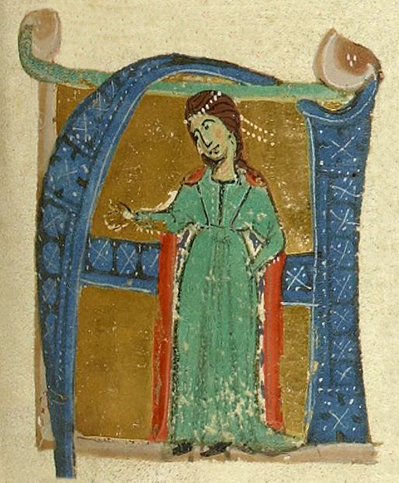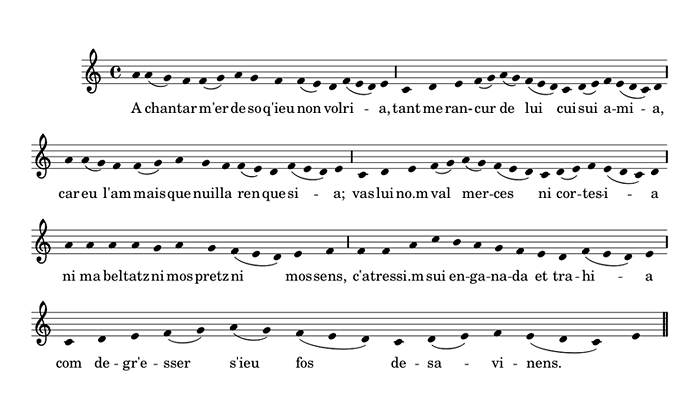A chantar m'er
This is a 12th century Occitan language song by Beatritz de Dia (1135-1185). It's the only surviving song by a female troubadour where both the lyrics and music have been preserved.

A chantar m'er
I Will Sing
Love Song
Love Song
(Occitan)
(English)
A chantar m'er de so qu'eu no volria,
tant me rancur de lui cui sui amia;
car eu l'am mais que nuilla ren que sia:
vas lui no.m val merces ni cortezia
ni ma beltatz ni mos pretz ni mos sens;
c'atressi.m sui enganad' e trahia
Com degr' esser, s'eu fos dezavinens.
D'aisso.m conort, car anc non fi faillensa,
Amics, vas vos per nuilla captenenssa;
ans vo am mais non fetz Seguis Valensa,
e platz mi mout quez eu d'amar vos vensa,
lo meus amics, car etz lo plus valens;
mi faitz orgoil en digz et en parvensa,
et si etz francs vas totas autras gens.
Meraveill me cum vostre cors s'orgoilla,
amics, vas me, per qui'ai razon queu.m doilla;
non es ges dreitz c'autr' amors vos mi toilla,
per nuilla ren que.us diga ni acoilla.
E membre vos cals fo.l comensamens
de nostr'amor! Ja Dompnedeus non voilla
qu'en ma colpa sia.l departimens.
Proeza grans, qu'el vostre cors s'aizina
e lo rics pretz qu'avetz, m'en ataïna,
c'una non sai, loindana ni vezina,
si vol amar, vas vos no si' aclina;
mas vos, amics, etz ben tant conoissens
que ben devetz conoisser la plus fina;
e membre vos de nostres partimens.
Valer mi deu mos pretz e mos paratges
e ma beutatz e plus mos fins coratges;
per qu'eu vos man lai on es vostr' estatges
esta chanson, que me sia messatges:
e voill saber, lo meus bels amics gens,
per que vos m'etz tant fers ni tant salvatges;
no sai si s'es orgoills o mal talens.
Mais aitan plus voill li digas, messatges,
qu'en trop d'orgoill an gran dan maintas gens.
I will sing of that which I wouldn't have wanted to,
As I complain so much about the one whose friend I am,
For I love him more than I love anybody else:
Neither pity nor courtesy, neither my beauty
Nor my worth, nor my spirit have any value to him,
So thus I've been deceived and betrayed
As I should be if I was unpleasant.
Of that, I comfort myself since I never failed you
Friend, in any way.
On the contrary, I love you more than Seguin loved Valensa*
And it pleases me greatly to surpass you in love,
My friend, because you are the most valiant;
You're prideful towards me in words and deeds,
But you're amiable to other people.
I am amazed at how your heart shows conceit
Towards me, my friend, and I have reasons to suffer;
It's not fair that another love should take you from me
For no one thing she told you or permitted of you.
And remember what the beginning
Of our love was! May the Lord God never want
The separation to be my fault.
The great goodness that dwells in your heart
And the rich value you have worries me,
For I know of none, from far away or near
Who wouldn't be inclined towards you if she wanted to love;
But you, my friend, you are so skilled
That you should well know the most perfect one
And remember our agreements.
My value and my birth and my beauty
And my most perfect courage must merit me some worth.
It's why I send to you in your abode
This song, so that it may be my message:
I want to know, my fine and sweet friend,
Why you are so cruel and so fierce towards me;
I don't know if it's pride or bad intentions.
But I want you to tell him, messenger,
That many people are damaged by too much pride.
Notes
*Seguin and Valensa are legendary lovers in a lost romance. The only other mention of this mythical couple is found in a song from the 12th century by Arnaut de Marueil called "Tant m'abellis e. m plaz" (line #166 "Ni Valensa Seguis").
(Note: The different spellings of the name Seguin/Seguis is due to the Old Occitan declension.)
Comments
This song by Beatritz de Dia (1135-1185) is the only song that has been preserved with both lyrics and music. You can see the original music in this manuscript (Manuscrit du Roi) at the French National Library. The manuscript was created in the middle of the 13th century.
You'll find a valuable translation in Songs of the Women Troubadours by Bruckner, Shepard, White, New York; London: Garland, 1995.
The version of the song as sung by Martina de Peira is most faithful to the pronunciation of the time. She sings the verses 1, 3 and 5.

Thanks and Acknowledgements
Translation by Monique Palomares and Lisa Yannucci.
Score: Modern notation, cc.
Image: "Recueil des poésies des troubadours, contenant leurs vies" (Manuscript Date: 1201 - 1300). You can read the full song in the manuscript on this page on the bottom right section and the upper left section of the following page here.
Mercés


























